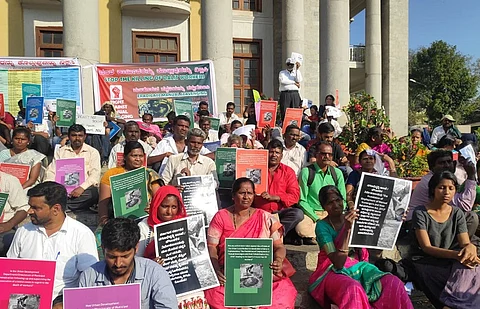

"Why is this repeatedly happening? How many times should we set aside our lives and protest on the streets?"
37-year-old Madhu's voice quivers in anger as he rapidly asks the questions. He shares that he was employed in manual scavenging work until a year ago.
He is now employed as a coolie worker in Nagawara in Bengaluru but on Tuesday, the questions raised by him were echoed by activists, workers and common citizens who gathered at Bengaluru’s Town Hall to register their dissent against the death of a young man employed in manual scavenging work.
On Saturday, Siddappa, a manual scavenging worker died of asphyxiation after he was made to enter a sewage chamber. Siddappa's family told TNM that he is 17-year-old but an FIR registered at Commercial Street police station identifies him as a 20-year-old.
The incident took place on Infantry Road in a building managed by the SSBS Jain Trust. Marianna, a labour contractor who went into the sewage chamber to rescue Siddappa, is critical and currently receiving treatment in hospital. Marianna was identified as the man who employed Siddappa to clean the sewage chamber after initially approaching him to clear debris at the building.
Police officials are yet to make an arrest in the case but an FIR was registered at the Commercial Street Police Station against managers, trustees and other responsible persons of SSBS Jain Trust.
The call for the protest on Monday was issued by All India Centre for Trade Unions (AICCTU), Safai Karmachari Kavalu Samiti, All India People's Forum, People's Union for Civil Liberties, and Slum Janandolana.
The organisations submitted a memorandum to the Karnataka government's Labour Department highlighting the deaths of 85 workers employed in manual scavenging work in the last 25 years.
The memorandum called for a Legislative Committee to conduct a probe into manual scavenging deaths and report the status of investigation and trial. It also asked for compensation to be paid to families of manual scavenging workers. It also stated that a special investigation team should investigate the death of Siddappa and take action against the responsible persons from SSBS Jain Sangh Trust. Activists point out that most people employed in manual scavenging work are Dalits.
Labour Commissioner KG Shantharam received the memorandum from the protesters at Town Hall.
Madhu says that the government should identify manual scavenging workers to ensure that they do not risk their lives on a day-to-day basis. "This can happen to anyone who enters a sewage chamber to clean it. The workers are not provided with equipment like masks and gloves to protect ourselves. They used to be paid Rs 300 to 500 for cleaning one chamber," Madhu says.
Shakuntala, a member of Safai Karmachari Kavalu Samiti, an organisation working for the rights of manual scavenging workers, says that the next step is to rehabilitate them. "The workers should be given training in other professions so that they stop cleaning sewage chambers. Many people we work with are unaware that the law bans manual scavenging," says Shakuntala, who works in Bengaluru Rural district.
Since 1993, employing a manual scavenging worker is a cognisable offence punishable with imprisonment and fine. The Prohibition of Employment as Manual Scavengers and their Rehabilitation Act, 2013, and a Supreme Court ruling has also stated the same.